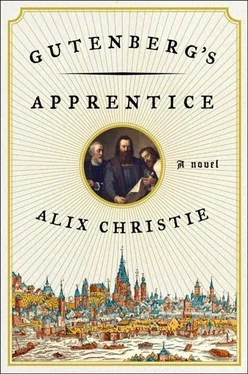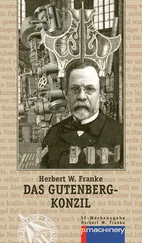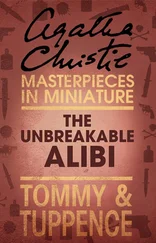The large head dipped, and Peter saw the losses layered in those once-bright eyes. “I wish you well — you know I’ve always only wished for you the best,” his father said.
“Then wish me this,” he softly answered. “We’ve almost done what we set out to do — together. Let’s finish it that way. Let me remain — not lost to you, but near, giving you books, and grandchildren to honor you, as long as I am able.”
Fust closed his eyes and sought; he prayed. His forehead creased as he stood waiting to receive, head bowed above the linen altar of the chest on which reposed his crucifix.
“Go then with God.” He opened up his eyes. “May you and yours remain forever in His hands.” He held one hand out toward his son, a look unreadable upon his face — bittersweet in parting, yet softened by the bond that always would exist between them.
His hand hung half a heartbeat in the air until Peter clasped it.
“I always hoped and prayed to make you proud,” he said. “And that will never change.”
A flicker lifted Fust’s gray lips, and with a nod he shifted toward him and the two of them embraced.
What was this feeling that shot through him, prying open every vessel underneath his skin? That prickled at the lining of his chest, lifted the blood into his cheeks, the hairs upon his arms, as he stood with one hand lifted at that bright blue door? The gold of summer lighted the blue glaze, the same blue tint that once had stained her fingertips. He’d half forgotten he could feel this, had consigned it to a frozen depth. But now he knew, his fingers reaching for the knocker: this was joy.
Klaus Pinzler’s shock was clear upon his narrow, bearded face. His mouth worked for an instant as he looked upon the long-lost suitor on his doorstep. His eyes went to the bunch of daisies Peter had gone culling from the fields.
“I’m much delayed,” said Peter slowly, letting time expand, so that in this one drawn-out instant the whole year past might dissolve. “I’ve been a fool,” he told the man. “But I would hope to learn more patience in this house.”
Klaus wonderingly shook his head. Across his cheeks, a fleeting twitch. “You are a lucky man.” His lips made a straight line. “Luckier by far than I might have allowed.”
Anna, then, had spoken of him somehow. Her father stepped back and opened wide their house.
Peter should have made his declaration then — as Anna’s mother came to join Klaus, drying off her hands and searching Peter’s face, his Sunday clothes, with anxious eyes. But this to him would have been one more wrong he did their daughter. These were new times, he a new man. He could not ask her father until he showed her the respect that she was due: to choose herself, and to give freely her own hand.
“With your permission, I would speak to Anna,” Peter said. Klaus looked at his wife. Alone, he’d have refused, but Anna’s mother nodded.
Above them, stepping lightly down her ladder, floating almost, Anna came: not retiring, but aglow, her dark hair flowing. Her parents disappeared behind the curtain to the kitchen. Peter held his arms out as she put her foot on the last step but two, and she released the rail and soared toward him. He smelled vanilla in her hair and musk; his lips brushed the soft down upon her cheek. Blood hammering, he set her down, hands lingering about her ribs, the dainty cage that held her heart. Her skirts were full as he went down upon his knees.
“Peter,” she said, reaching out her hand, but he would not be raised. He took it, pressed it to his lips. He looked up in those large and shining eyes and could not speak at first for the emotion.
“Get up,” she whispered, smiling, bending, dropping a light kiss on his head. The brush of her against him, breathing, the slight pressure of her breasts, fired him with desire. Firmly then he grasped her by the waist and held her out, away.
“If you will have me,” he said huskily, “I would make you my beloved wife.”
She opened her red lips; her cheeks flared up. “Yes,” she said. “Oh, yes.” She smiled; her body shuddered, and the tears sprang in her eyes. She freed her hand to dash them, and then, turning, looked toward the alcove where her parents waited. “Papa said yes?” she asked in a low whisper.
Peter stood and reclaimed both her hands. “You had the right of first refusal.”
A look of sheer delight infused her face. She bit her lip, a girl again; a little laugh escaped. “You never follow any rules.” She was still smiling, dark eyes bright.
“Just rules you give, from this day on.” He pressed her hands back to his lips. She beamed at him, and then, all seriousness again, she smoothed her skirts. “I’ll wait upstairs, then.”
He watched her float back up. Then he turned back to the old ways, formality and gravity, the manner in which such things were done. He sought and gained permission, posted banns. The fathers settled terms, modest though they were. Fourteen days later they all met again beneath the painter’s roof to seal it with the handshake. The harvest was upon them; they’d have to wait at least until the grain was in. But in the eyes of Mainz their fates were joined, and so at last could be their bodies, after all this time.
It happened in a hayfield one late summer evening, when the sky was a deep teal, pricked by some early stars. The handles of the pitchforks jutted from the stacks in a loose ring that Anna fancied wove a charm around them. Her dress was sprigged with flowers, but the flowers he most wanted were these two, he said, and peeled the fabric from her shoulders. She lay against the mound, and arched her back, eyes closed, as he caressed her breasts with lips and hands. Her legs and skirts were wound and crossed around his hips, and he could feel her strength, her force, her youth and hunger, in the flexing as they kissed. Gently Peter slipped his hand beneath her head and raised it, looking for a moment into those clear dark eyes. “I would not hurt you for the world.” She laughed and pulled his face to hers. “No one can hurt us now,” she whispered, and he felt himself expand and open, with a rush of blood, the power flooding through his body and then hers. She cried out as he entered her, but just as quickly threw her head back, opened to him. Squeezed and rolled with him in pure abandon, like the creatures that they were, alive, aroused, withholding nothing underneath the open sky. They fit together like two interlocking pieces, red and blue, then gilded, flecked about with stars: the sense of freedom and surrender, when it came, was nothing he had ever felt before. No one could touch them now; he fondled her; he grazed his lips upon her throat, her belly. Anna darted her light tongue across his cheeks, his closed and dreaming eyes. She’d always be there, at his side. Her skin beneath her clothes was just as white as the thin vellum she had finally accepted as that other love of his — those metal letters with which henceforth she would share his life.
CHAPTER 6: THURSDAY AFTER SAINT BERNARD OF CLAIRVAUX
[65 of 65 quires]
22 August 1454
THE FINAL SPRINT was blind, their bodies pumping with rote motion. The last page to come off the press was from Ezekiel, the prophet. Gutenberg was there as the sun set, to watch all hundred eighty copies of that page emerge that final night. All that was left now was the gathering of pages into books and printing off the guide to rubrication.
Already Peter sensed it all unwinding: Keffer and Ruppel printed the master’s letter of indulgence; the Bechtermünzes and the extra boys had been let go, at least for several weeks. Peter and Mentelin prepared the guide that would be used to letter in the red incipits and explicits , lines of prologue, with instructions for their proper placement in the printed text. The psalter waited patiently: all efforts were directed toward the Bible, and Autumn Fair.
Читать дальше












